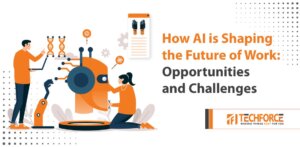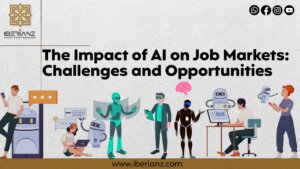AI and Its Impact on Jobs in Pakistan: Opportunities & Challenges

Discover how artificial intelligence (AI) is transforming jobs in Pakistan. Learn about the opportunities, challenges, and future trends shaping the employment landscape.
AI and Its Impact on Jobs in Pakistan: Opportunities & Challenges
Introduction
Artificial Intelligence (AI) is revolutionizing industries across the globe, and Pakistan is no exception. With advancements in automation, machine learning, and AI-driven solutions, the job market is undergoing a significant transformation. While some fear job losses due to automation, AI is also creating new career opportunities. In this article, we will explore how AI is impacting employment in Pakistan, the challenges it presents, and the potential for future growth.
How AI is Changing the Job Market in Pakistan

AI is reshaping various sectors, from IT and healthcare to finance and agriculture. Here are some key areas where AI is making an impact:
1. Automation in Traditional Jobs
Many repetitive and manual tasks are being replaced by AI-powered automation. Industries like manufacturing, customer service, and retail are seeing increased use of chatbots, robotic process automation (RPA), and AI-driven analytics. This shift reduces the demand for low-skilled labor but also opens doors for AI maintenance and oversight roles.
2. Emergence of AI-Related Jobs
With the rise of AI, new job roles such as data scientists, AI engineers, machine learning specialists, and cybersecurity analysts are in high demand. Companies in Pakistan are actively seeking professionals with AI expertise to develop and manage AI-driven technologies.
3. AI in Healthcare
AI is playing a crucial role in Pakistan’s healthcare sector. From AI-assisted diagnostics to robotic surgeries, technology is enhancing medical precision and efficiency. This has increased the need for AI-skilled healthcare professionals who can work alongside AI tools to improve patient care.
4. AI in Agriculture
Pakistan’s agriculture sector is benefiting from AI-driven solutions such as precision farming, automated irrigation systems, and crop disease detection. These innovations help farmers improve yield and reduce waste, requiring a new workforce trained in agri-tech solutions.
5. Impact on the IT Sector
The IT industry in Pakistan is booming, with AI leading the way. Software companies are increasingly integrating AI into their applications, creating demand for AI developers, cloud computing experts, and AI trainers. Freelancers skilled in AI-related services are also finding more opportunities in the global market.
Challenges Posed by AI in the Job Market

While AI presents numerous opportunities, it also comes with challenges:
1. Job Displacement
Automation is replacing many traditional jobs, especially in customer support, data entry, and manufacturing. Workers in these sectors must upskill to remain relevant in the evolving job market.
2. Skill Gap
Pakistan faces a shortage of professionals trained in AI and machine learning. Universities and training institutes must update their curriculums to include AI-focused courses to prepare students for future job opportunities.
3. High Cost of AI Implementation
Small and medium enterprises (SMEs) in Pakistan often struggle to adopt AI due to high implementation costs. Government and private sector collaboration is needed to make AI adoption more affordable and accessible.
4. Ethical and Privacy Concerns
The use of AI raises ethical issues, including data privacy and security. It is crucial to implement strong regulations and policies to prevent misuse of AI technology.
How Pakistan Can Prepare for an AI-Driven Future

To maximize the benefits of AI while minimizing its negative impact, Pakistan needs to take proactive steps:
1. Investing in AI Education and Training
Introducing AI-related courses in universities and vocational training centers can help bridge the skill gap. Online platforms like Coursera, Udemy, and local tech institutes can offer AI certification programs.
2. Encouraging AI Research and Innovation
The government and private sector should invest in AI research labs and innovation hubs. Collaborations with international AI firms can also accelerate Pakistan’s AI development.
3. Supporting AI Startups
Startups play a crucial role in driving AI innovation. Providing funding, mentorship, and networking opportunities can help AI entrepreneurs thrive in Pakistan’s digital economy.
4. Implementing AI Regulations and Policies
To ensure ethical AI use, Pakistan must develop strong regulations on data privacy, AI accountability, and fair employment practices. AI policies should encourage responsible AI development while protecting workers’ rights.
Conclusion
AI is transforming Pakistan’s job market, bringing both challenges and opportunities. While some traditional jobs may be at risk, AI also creates new career paths in technology, healthcare, agriculture, and beyond. By investing in AI education, research, and policy-making, Pakistan can prepare its workforce for an AI-driven future and harness the power of artificial intelligence for economic growth.
